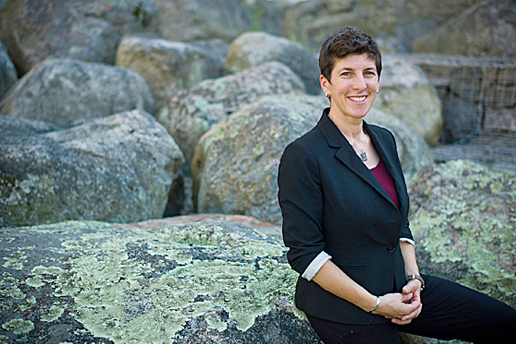
Julie Newman, MIT’s first director of sustainability, brings to her new post a portfolio as one of the nation’s most experienced leaders on sustainability in higher education.
Newman, who assumed her role in mid-August 2013, came to MIT from a similar position at Yale University, where she led a sustainability initiative for the last nine years. MIT Executive Vice President and Treasurer Israel Ruiz initiated the creation of the new post—and simultaneously created an Office of Sustainability to serve as a catalyst for advancing sustainable approaches and practices across campus and beyond.
“Julie brings an unparalleled level of energy and enthusiasm to the work of integrating sustainable processes into all aspects of the Institute,” Ruiz says. “Her presence on campus brings us one step closer to realizing our vision of the campus as a living laboratory where we test new ideas. Julie will be key to advancing MIT’s work with both the City of Cambridge and the City of Boston.”
Starting in 1997, Newman spent seven years establishing an office of sustainability at the University of New Hampshire—“one of the first offices of sustainability in the country,” she says. After receiving her doctorate in natural resources and environmental studies from UNH in 2004, she moved to Yale as founding director of its Office of Sustainability.
Newman is “excited about…the opportunity to work as a catalyst to ensure the integration of sustainability principles across all the operational units of the Institute.” She plans to examine “what the underlying goals are, ranging from capital construction to small-project renovations, energy systems, transportation systems, operations and maintenance, waste management, recycling, water management, procurement, and land management.” Her analysis will also examine novel opportunities for financing, organizing, and planning such projects.
Newman aims to position MIT’s campus “as a living and learning laboratory for sustainability. When successful, our campus sustainability work will make direct and meaningful contributions to the core teaching and research mission of the Institute.” The opportunities, she says, “may range from testing new technologies currently being developed in labs on campus to studying the organizational behavior that enables a sustainable campus.”
Newman will help build upon MIT’s past sustainability accomplishments. For more than 10 years, MIT has taken steps to reduce its energy and environmental impact while actively contributing to local, regional, and global initiatives. For example, Building E62 at the Sloan School of Management—opened in 2010—consumes 45% less energy than some comparable buildings; and more than 90% of MIT’s existing buildings have been retrofitted for energy efficiency.
“We’re delighted to have Julie join MIT, bringing her leadership and expertise to our campus sustainability efforts,” says Robert Armstrong, director of the MIT Energy Initiative (MITEI). “She and the new sustainability office will enhance our already strong collaboration with the Office of the Executive Vice President and Treasurer and the Department of Facilities in education, faculty engagement, and student projects both inside and outside the classroom.”
John Sterman, the Jay W. Forrester Professor of Management at MIT Sloan and a member of MIT’s Campus Energy Task Force since its establishment by MITEI in 2007, says that the creation of this new position “will help us accelerate the progress we’ve been making to become more efficient and to promote sustainability more broadly.” He applauds the selection of Newman, calling her “knowledgeable, experienced, and energetic.”
Joining Newman in the Office of Sustainability are deputy director Steven Lanou, who previously led sustainability programs in MIT’s Environment, Health, and Safety Headquarters Office, and sustainability projects coordinator Susy Jones.
This article appears in the Autumn 2013 issue of Energy Futures.